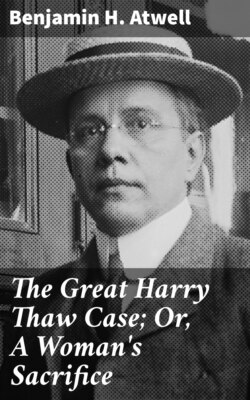Читать книгу The Great Harry Thaw Case; Or, A Woman's Sacrifice - Benjamin H. Atwell - Страница 10
На сайте Литреса книга снята с продажи.
CHAPTER VI.
“I Swear Harry K. Thaw Was Insane.”
ОглавлениеTable of Contents
DEFENSE BEGINS TERRIFIC FIGHT TO PROVE YOUNG MILLIONAIRE WAS CRAZED BY WHITE’S ACTS—DR. WILEY, THAW’S FAMILY PHYSICIAN, DECLARES HARRY DID NOT REALIZE WHAT HE WAS DOING—THEATER EMPLOYE PROVED IMPORTANT POINT THAT WHITE HAD THREATENED YOUNG THAW—ANOTHER PHYSICIAN ASSERTED THE SLAYER, WHILE YOUNG, HAD ST. VITUS DANCE, A DREAD MALADY THAT MIGHT HAVE AFFECTED HIS BRAIN—EVELYN PALE AND WORRIED—PRISONER RAGING IN HIS CELL—THE CRISIS AHEAD.
Experts on the subject of insanity—famous physicians whose testimony cost from $100 to $500 a day each, and whose services required an expenditure of more than a half million dollars—were the central figures in the early part of this celebrated trial. The defense began by forging the links in the chain of circumstances which, it was asserted, had disordered the brain of Harry Thaw and caused him to kill White.
The first witness for the defense was Dr. C. C. Wiley of Pittsburg, the Thaws’ family physician, who was connected with the Dixmont Insane Asylum. During Dr. Wiley’s examination, the young prisoner sat with paper and pencil, taking notes and consulting
DELPHIN M. DELMAS
Thaw’s chief lawyer.
constantly with his counsel. He was pale and nervous, and shuddered at the slightest unusual noise in the court room. Jerome went at the witness pitilessly, asked him trick questions, and endeavored a hundred times to trap him into an admission that Thaw might not have been insane at the time he killed White.
Jerome failed. When the day had closed the evidence as to insanity remained unshaken, but the witness was exhausted and so confused that he often took refuge in the answer “I don’t know,” or “I cannot recall.”
Mr. Gleason, attorney for Thaw, asked the expert a hypothetical question the answer to which immeasurably strengthened the plea that Thaw was insane. It was:
“Assuming that any man was proved to you, as an expert, to have attended a roof garden the day of June 25, 1906, the occasion of the opening of a theatrical entertainment which was largely attended, and that on walking out from the theater, with his wife near him, and apparently in a quiet and orderly manner; that that man should turn aside and fire three shots from a revolver into a man who was sitting at the table and to whom he did not speak; that this man then held the pistol above his head and walked quietly toward an elevator; that he gave up the pistol without resistance and did not make any attempt to escape, and that he said, ‘He ruined my wife,’ and that immediately thereafter he said to his wife, ‘I have probably saved your life,’ I ask you, sir, upon your judgment as an expert, whether you are able to give an opinion touching on the sanity of the man who made that answer?”
“I can,” said Dr. Wiley.
“Will you express that opinion?”
“I believe that that man — —”
District Attorney Jerome objected.
“You must not state a belief,” said Mr. Jerome, “that is not evidence. You must give an opinion.”
“My opinion,” said Dr. Wiley, “is that the man who committed the act described was suffering from insanity.”
Other striking assertions from Dr. Wiley’s testimony were:
“The act of Harry K. Thaw was that of an insane man.
“The remark Thaw made to his wife after the tragedy, ‘I have probably saved your life,’ is an indication of an insane delusion.
“I have examined 800 people as to their sanity, and should know the prisoner’s condition.
“When I examined Harry in the Tombs prison after the murder his actions were irrational.”
Dr. Wiley was on the stand for the defense all the first day, and at the opening of the second day a sensation came when Mr. Delmas took the helm of the defense, and called Benjamin Bowman as the second witness. Jerome had refused to allow Bowman to
